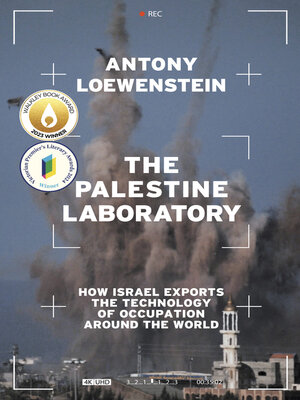The Palestine Laboratory
ebook ∣ how Israel exports the technology of occupation around the world
By Antony Loewenstein

Sign up to save your library
With an OverDrive account, you can save your favorite libraries for at-a-glance information about availability. Find out more about OverDrive accounts.
Find this title in Libby, the library reading app by OverDrive.



Search for a digital library with this title
Title found at these libraries:
| Library Name | Distance |
|---|---|
| Loading... |
WINNER OF THE 2023 WALKLEY BOOK AWARD
WINNER OF PEOPLE'S CHOICE AT THE VICTORIAN PREMIER'S LITERARY AWARDS 2024
SHORTLISTED FOR THE 2024 ABIA SOCIAL IMPACT BOOK OF THE YEAR
Bestselling journalist Antony Loewenstein uncovers the widespread commercialisation and brutal deployment globally of Israel's occupation-enforcing technologies.
For more than 50 years, the occupation of the West Bank and Gaza has given the Israeli state invaluable experience in controlling an 'enemy' population, the Palestinians. It's here that they have perfected the architecture of control, using the occupied Palestinian territories as a testing ground for weaponry and surveillance technology that they then export around the world.
The Palestine Laboratory shows in depth and for the first time how Israel has become a leader in developing spying technology and defence hardware that fuels some of the globe's most brutal conflicts — from the Pegasus software that hacked Jeff Bezos's and Jamal Khashoggi's phones, and the weapons sold to the Myanmar army that has murdered thousands of Rohingyas, to the drones being used by the European Union to monitor refugees in the Mediterranean who are left to drown.
In a global investigation that uncovers secret documents, based on revealing interviews and on-the-ground reporting, Antony Loewenstein shows how, as ethno-nationalism grows in the 21st century, Israel has built the ultimate tools for despots and democracies.







